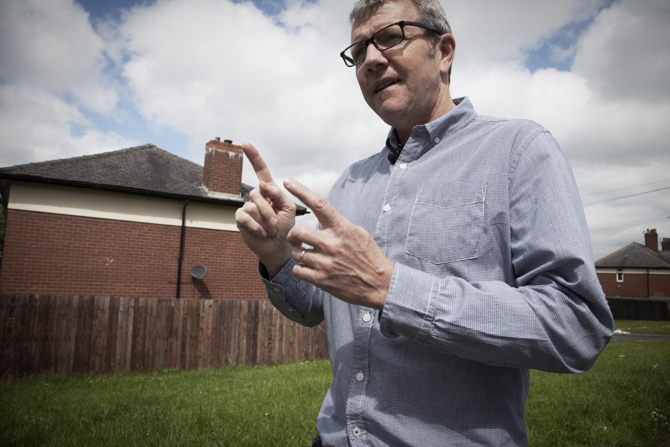Responding to need
“The rain in Spain falls mainly on the plain,” he says in mock BBC English.
“That’s okay, now just put the recorder in your back pocket.”
We’re having a walk around the estate this morning and rather than holding the tape recorder in front of Tony’s face the whole time, I’ve dug out a lapel microphone and wired him up as if he’s about to narrate some TV documentary.
Tony is Bolton at Home’s neighbourhood manager for Breightmet. He’s Vanessa’s boss and before that he used to manage the UCAN himself. He’s passionate about the power of the Urban Care and Neighbourhood Centres and he and his colleagues commissioned me about a year ago, to spread the word with this blog.
“Let’s go up this way,” he says, crossing the busy road outside the UCAN, “I want to show you something.”
As we walk and talk I ask how the idea started. “They were set up in 1999 in one of Bolton’s Private Sector Renewal Areas. I was working for another housing association at the time and I came to visit the very first one. I vividly remember walking out of there and thinking, now that’s how you have an impact on a neighbourhood.
“It started in a single terrace house and was there to offer advice to people who were having their bathrooms and kitchens refurbished. But residents were also coming in asking questions about employment and training or with debt queries. So, rather than turning people away, the staff started to offer a service in response to their residents’ needs. Simple.”
Turning off the main drag we’re on a street festooned with England flags and bunting. “It’s incredible, isn’t it?” says Tony. “It’s been in the Bolton News.”
Empty cans and bottles spill out of bin liners on the grass verge. “Someone was having a party last night,” says a young woman passing by.
“Looks like it was a good one,” I reply, taking photos of the rubbish as if I’m collecting evidence.
“It weren’t bad,” she says.
“Working with individuals is a no-brainer for me,” says Tony as we continue our stroll. “It’s always going to be as important as physical regeneration.”
“But that hasn’t always been the case, has it? That’s a relatively recent revelation, and the penny hasn’t dropped everywhere, even now.”
“That’s right. There are still places where they think they can solve the problem just by making a place look better. It’s a very appealing solution. But working with people is the slow, hard bit.”
“Hi Tony,” says a middle-aged woman with a teenage girl in tow.
When Tony enquires, the woman turns her back on her daughter, rolls her eyes, and says, “I got a call from school, didn’t I? She has a temperature. Could I come straight away? She seems fine now.”
The ‘poorly’ girl has walked off down the hill and, as her mother takes off after her, I ask Tony to explain whether housing associations have some sort of legal responsibility to their tenants. What’s in it for them to offer all this support?
“There’s a genuine desire to improve the lives of tenants,” he says, “to go beyond the core functions of collecting rent and doing repairs.”
“So, you don’t have to do it?”
“No, you could stick to your core function and I’m surprised that many associations still do. For some, offering a bit of employment support is a massive step for them. It would be wrong for us to turn round to our tenants and say, we know you are in massive debt but that’s not what we do. For me, the fundamental thing is responding to need.”
I hear the tape click off in his back pocket and so we stop while I turn it over and set it off again.
… continued in Low level genius


